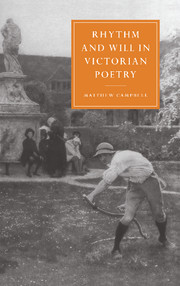Book contents
- Frontmatter
- Contents
- Preface and acknowledgements
- Texts used
- Chapter 1 Introduction: two decisions
- Part One RHYTHMS OF WILL
- Part Two MONOLOGUE AND MONODRAMA
- Chapter 4 Browning and the element of action
- Chapter 5 ‘'Tis well that I should bluster’: Tennyson's monologues
- Part Three MAKING A WILL
- Notes
- Bibliography
- Index
- CAMBRIDGE STUDIES IN NINETEENTH-CENTURY LITERATURE AND CULTURE
Chapter 5 - ‘'Tis well that I should bluster’: Tennyson's monologues
Published online by Cambridge University Press: 22 September 2009
- Frontmatter
- Contents
- Preface and acknowledgements
- Texts used
- Chapter 1 Introduction: two decisions
- Part One RHYTHMS OF WILL
- Part Two MONOLOGUE AND MONODRAMA
- Chapter 4 Browning and the element of action
- Chapter 5 ‘'Tis well that I should bluster’: Tennyson's monologues
- Part Three MAKING A WILL
- Notes
- Bibliography
- Index
- CAMBRIDGE STUDIES IN NINETEENTH-CENTURY LITERATURE AND CULTURE
Summary
The Gods, the Gods!
If all be atoms, how then should the Gods
Being atomic not be dissoluble,
Not follow the great law? My master held
That Gods there are, for all men so believe.
I prest my footsteps into his, and meant
Surely to lead my Memmius in a train
Of flowery clauses onward to the proof
That Gods there are, and deathless. Meant? I meant?
I have forgotten what I meant: my mind
Stumbles, and all my faculties are lamed.
(‘Lucretius’, 113—23)Browning allows his virtuous intellectuals, Caponsacchi and the Pope, just so much volitional power before he suggests its limits. Caponsacchi's tasking of his whole mind to touch and clasp the ‘serious thing’, and the Pope's ‘hard labour and good will, / And habitude’ still do not fully equip them for the ‘initiatory pang’ or ‘quite new quick cold thrill’ which upsets the verse as it courses through their thought and speech. Tennyson's speakers, in thrall to mood as they and their poet are, have even rarer moments of decisiveness. By temperament, chance or error they often find themselves suffering from the great interruption into their intellectual and emotional lives of the moment of unwilled powerlessness such as Lucretius marks in his monologue. ‘Meant? I meant?’ he suddenly asks himself, picking up the word he has used four lines previously, before speaking in a present tense which knows only of his new-found forgetfulness, and the disabling of his stumbling mind and lame faculties.
- Type
- Chapter
- Information
- Rhythm and Will in Victorian Poetry , pp. 125 - 154Publisher: Cambridge University PressPrint publication year: 1999



